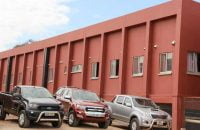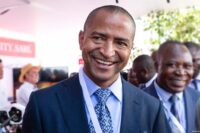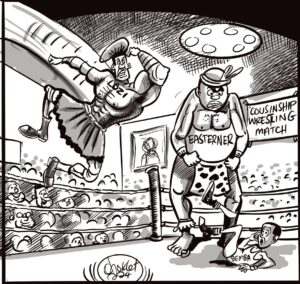Chief Government Spokesperson Dora Siliya says there is no debt crisis in Zambia and the austerity measures being rolled out are simply a way to prepare for repayments which will fall due in the next few years.
And Siliya says the Higher Education Loans and Scholarship Board’s (HELSB) move to ask for repayment from UNZA and CBU alumni is not sudden as it is the only way to ensure sustained provision of education to the vulnerable in society.
Speaking on ZNBC’s Sunday Interview, Siliya, who is also Minister of Information and Broadcasting, said the speculation on Zambia’s debt was injuring the country’s image.
“On this issue of debt, in 1990, the debt was $7 billion, the GDP was only one billion dollars so that means that the gearing was over 227 per cent so when you are talking about this debt that is about $14.3 billion. The GDP of Zambia now is about $27.4 billion. There has been progress but we are the first ones to accept as government that we can do more. There is no debt crisis. Yes, people are speculating about what will happen in the next three, four, five years, we also as government we are looking at these issues and preparing and saying how do we move forward and ensuring that the economy continues to thrive, that the Zambians are cushioned and that the Zambians who are vulnerable through social cash transfer and other programs are supported,” Siliya said.
“We should give the Minister of Finance room to operate. What we should not be doing is creating an atmosphere of doom, I do not think that’s the interest of the people of Zambia. We as government don’t see the IMF as enemies, we see them as partners whom we continue to dialogue with. When they ask for information, we have to do so and we, as stakeholders in the IMF, we also have an interest to ensure that the people of Zambia, we give the right information and the Minister of Finance has been working tirelessly I can tell you, way in the night, the President stays up way into the night to ensure that these issues should continue to be looked at with the importance they deserve.”
Asked why government was implementing austerity measures if there was no crisis, Siliya said those were just meant to save up for loan repayment.
“No no no, I think what we are saying as government is that at some point in the future, we will have to make some huge payments and it is good to be cautious and try to prepare for the future. That is what we do even at home level and the Minister of Finance is saying ‘this is what we have, I am anticipating that at some point, we will have to make payments, so let us start preparing for those payments and there is absolutely nothing wrong with that, nothing,” she said.
“In today’s world with this convergence of technology, one statement can just go viral and injure the image of the country. it is why it is very important that we discuss these things without emotion because this is about our country. Right now, there is no crisis, there is none there is no debt crisis and the economy continues to move.”
Siliya also dismissed media reports that government had asked the IMF to recall its representative Alfredo Baldini saying government was actually looking forward to working with the IMF’s next representative to Zambia.
She warned that continued speculation on Zambia’s debt position would injure the country’s image.
“Give the Minister of Finance room to do her work on behalf of the people of Zambia. I think speculation will just continue to damage the country’s image and it is what filters through to even the international financial markets, because we are all speculating. I think our core message as government is that give the Minister of Finance room to do her work and she will continue to update the nation on the issues vis a vis the IMF, on the issues to do with the discussions which will be going on in China or anywhere else,” Siliya said.
“It is strange to say that Zambians don’t trust this government, I think they do and that’s why they even voted this government in office and at this time, this is the only government that exists and we continue to work with citizens through programs like this so that we can communicate that this is the situation. The Minister of Finance has been releasing the figures consistently the whole year so that citizens are aware and when the IMF has come and said ‘what about this’, the Minister of Finance has gone back as she should to check so that we get the best position ever, going forward. Government has no reason to hide anything from the citizens or from anybody else for that matter.”
And Siliya said it was good that HELSB had started collecting loans from UNZA and CBU alumni.
“These discussions have been going on for a long time. Those that have gone to universities around the world, we know that university education is one of the most expensive. People in other countries pay university loans for over 20, 25 years of their working life and if we are going to have sustained provision of these loans in Zambia, so that we can have the scientist we need, so that we can have the engineers, the doctors, we have to find a way to fund higher education…in principle, loan facilities to students are the right thing so that when they graduate, they can pay back and other children also get a chance. Thousands of Zambians have gone to the University of Zambia and I am happy now that the university now wants to activate the alumni so that us who went there can be able to make a contribution as we do in other countries,” said Siliya.
“It is not sudden. the Minister of Education has been making a lot of statements on this matter. if some people have not been following, I think her door remains open to discuss these matters. I believe that when the laws were being put in place, there was a lot of public consultation. These have been on-going issues particularly in the last two, three years…the principle is the right one. of course government is aware that some graduates do not have jobs yet and that is the reason why it is important that jobs are created outside government. It is important that the economy continues to be resilient, that we keep the inflation at single digit as it is now, that we continue to see growth beyond the 4 per cent then we will see that jobs are being created within the economy.”












